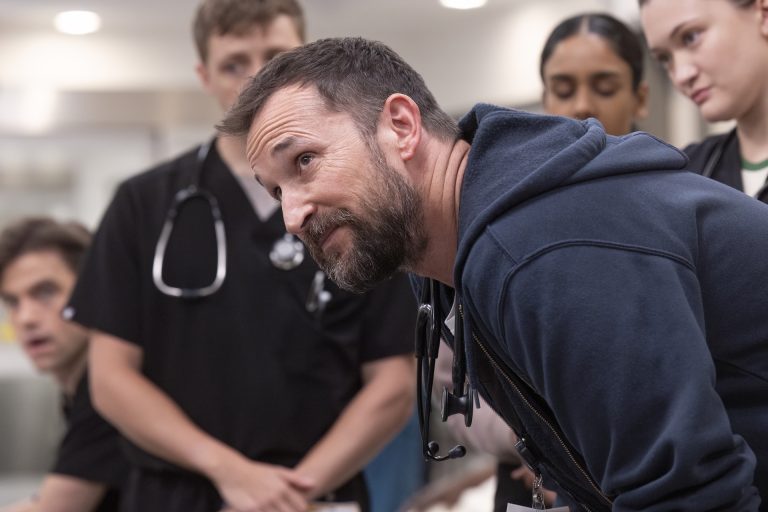It’s a bit disconcerting to see the “new kid” of Cook County General Hospital on the massive hit “ER” become the grizzled veteran of a similar medical drama three decades later, but that’s where we’re at with the very good “The Pitt,” a show that reminds one of the simple charms of well-done procedural television.
The incredibly influential John Wells was a producer on that NBC smash (along with a stunning resume that includes “The West Wing,” “Southland,” “Shameless,” “Maid,” and many more). The story goes that “The Pitt” was once conceived as a sequel to “ER” but has evolved since into a very different show. Yes, we’re back in a hospital with more relentless pacing and no time for personal lives. (And the difference in language and image restrictions from NBC to Max changes the tone, too.) “The Pitt” unfolds over 15 real-time episodes, 15 hours in an emergency room in Pittsburgh where lives are changed – and sometimes saved or ended – in the blink of an eye. It’s a smart show that values character detail and intricate medical science that sometimes succumbs to doses of melodrama. But for everything that it does very well, that can be forgiven.
Noah Wyle does the best work of his career as Dr. Michael “Robby” Rabinavitch, the voice of reason and calm at the Pittsburgh Trauma Medical Hospital. But he’s also dealing with his own demons related to four years prior, when COVID turned ERs around the world into literal nightmares and took the life of his mentor. Brief flashbacks to that era look like a horror film, a reminder of how much trauma our medical professionals are carrying with them to this day. Wyle imbues Dr. Robby with just enough weariness to balance his innate kindness and intelligence. He is deeply emotionally present for his patients, colleagues, and students—it’s a teaching hospital—but also recognizes the systemic issues in his profession, especially in a subplot involving the powers that be looking for things like satisfaction ratings and threatening to take control of the ER from him.
As good as Wyle is here, “The Pitt” would be lesser if it was a one-man show. While I question how often Dr. Robby happens to be around for so many subplots to offer the right helping hand at just the right time, the writers enrich the ensemble of new faces as the season progresses. Standouts include Tracy Ifeachor as an experienced doctor with a secret, Gerran Howell as a new guy who struggles through some bad luck over the season regarding bodily fluids, Taylor Dearden as a young doctor who battles with anxiety, Isa Briones as the student who lacks in bedside manner, and the phenomenal Shabana Azeez as a student with a mother who happens to be a famous surgeon at the Pitt.

Is that relationship a TV convenience? Sure. And the writers have a habit of pushing that boundary between realism and manufactured melodrama—is every patient on this day stuck between life and death? There are no kids with easily breakable fevers and parents who go home happy? However, the sense that there are a few too many scripted stories is forgivable in the context of the history of the medical drama. We come to shows like this to witness the impossible and the unimaginable; to see people do that which we cannot and suffer that which we hope we never do. To that end, we forgive a bit of melodrama, only made more prominent here by how much of “The Pitt” strives for realism with elements like real-time pacing, no score, and some gnarly medical footage (a warning to the squeamish about such things).
It helps that the actors thrown into the patient subplots are uniformly strong as well, enlivened by the overall quality of the production. Stories involving siblings debating whether or not to override their dying father’s wish not to be intubated and parents realizing that their son has died from fentanyl exposure are devastatingly emotional. And these patient stories allow for some strong guest appearances, including Abby Ryder Fortson of “Are You There God, It’s Me Margaret,” Samantha Sloyan, and Mackenzie Astin, now old enough to have a dying father. Again, this show making me feel ancient.
“We need to laugh, otherwise we’d never stop crying,” says a doctor, and it’s a line that sounds scripted but true at the same time. “The Pitt” is constantly pulling between realism and fiction—the granular details of a real ER vs. making that interesting enough for TV. Dr. Robby’s constant wisdom and the “bit of everything” in the patient roster on this particular day remind you it’s a show. But that has been true of great procedural dramas since the genre was invented. They’re windows into excellence and heartbreak, allowing us to see a bit of ourselves in both.
Six episodes screened for review. Premieres with two episodes on Max on January 9th, subsequent episodes weekly.

